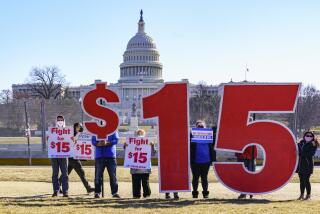Democrat Shift Fends Off GOP on Training Pay
- Share via
WASHINGTON — Senate Democrats offered today to expand slightly an existing sub-minimum wage for full-time students to head off what they called a “hire ‘em and fire ‘em” 90-day training wage backed by Republicans.
Sen. Edward M. Kennedy (D-Mass.), on his bill raising the minimum wage from its current $3.35 an hour to $4.55 an hour by 1991, offered an amendment that would allow employers to hire up to 12 students instead of the six now allowed for up to 20 hours a week at 85% of the minimum wage.
Only about 100,000 students are now earning the $2.85 sub-minimum wage, according to Labor Department officials, compared with 515,000 students in 1978. Kennedy said his proposal would allow employers to double the number of students at the sub-minimum wage on their payrolls.
Blocks Hatch Amendment
The tactic was aimed at heading off a Republican amendment by Sen. Orrin G. Hatch of Utah to establish an 80% training wage for newly hired workers for up to 90 days.
Hatch indicated that Republicans were unwilling to vote today on Kennedy’s student wage, putting off the key Republican-Democratic showdown on the politically volatile minimum-wage issue until next week, eight weeks before the November election.
Kennedy complained that none of the Republican training-wage proposals require employers to provide any training. He said their real purpose was to give employers a “windfall” lower wage in jobs that have turnover rates of up to 400% a year.
“Who honestly believes that it takes three months for someone to learn to mop a floor or change the sheets on a bed?” Kennedy said. “This is a pure and simple wage cut.”
He said the Republican proposal would provide employers with a powerful incentive to “throw working families out on the street once every 90 days” and replace them with a new force of trainees.
“This is the hire ‘em and fire ‘em wage, maybe we can call it the churn ‘em and burn ‘em wage,” Kennedy said.
More to Read
Get the L.A. Times Politics newsletter
Deeply reported insights into legislation, politics and policy from Sacramento, Washington and beyond. In your inbox twice per week.
You may occasionally receive promotional content from the Los Angeles Times.










